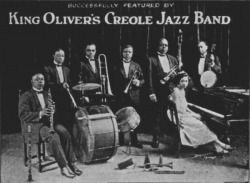The History of Jazz (Origins)

The standard legend about jazz is that it was conceived in New Orleans and moved up the Mississippi River to Memphis, St. Louis and finally Chicago. Of course that seems to be the history of what we now refer to as jazz, however, the influences of what led to those early New Orleans sounds goes back to tribal African drum beats and European musical structures.
In reviewing the background of jazz one can not overlook the evaluation over the decades and the fact that jazz spanned many musical forms such as spirituals, cakewalks, ragtime and the blues. Around 1891 a New Orleans barber named Buddy Bolden reputedly pitcked up his cornet and blew the first stammering notes of jazz, thereby unconsciously breaking with several centuries of musical tradition. A half-century later, jazz, America’s great contribution to music, crossed the threshold of the universities and became seriously, even religiously considered. Jazz functions as popular art and has enjoyed periods of fairly widespread public response, in the "jazz age" of the 1920s, in the swing era of the late 1930s and in the peak popularity of modern jazz in the late 1950s. Beginning in the 20s and continuing well into the 30s, it was common to apply the word "jazz" rather indiscriminately, melodically or tonally. Thus George Gershwin was called a jazz composer. For Gershwin’s concert work he was acclaimed to have made a respectable art form out of jazz. Somewhat similarly, Paul Whiteman, playing jazz-influenced dance music, was billed as the King of Jazz. Perhaps the broader definition of jazz, such as the one that would include the blues influence as well as those who shared our understanding of the art form, even if they did not perform it, would be the most useful historical approach.
STORYVILLE
Although Jazz did not originate in Storyville (it started off as a New Orleans style of music played all over town), but it did, in essence, flourish there as it did in the rest of the city; many out-of-town visitors first heard this style of music there before the music spread up north. Some early jazz writers suggested that Storyville was key in the development of jazz and that its closing was responsible for New Orleans musicians leaving for Chicago but this is now regarded as inaccurate. Some people from elsewhere continue to associate Storyville with the origins of jazz.
* Jelly Roll Morton * Louis Armstrong * Joe "King" Oliver * Kid Ory
